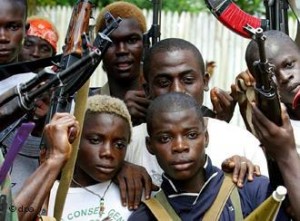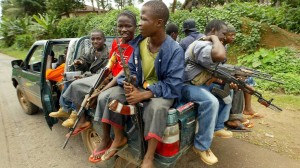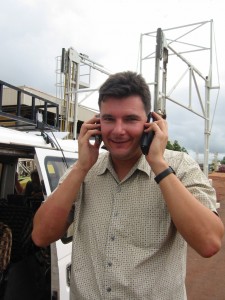Talking to a child soldier
In the third part of our series about difficult and challenging interviews, DW Akademie’s Rüdiger Maack tells us how he interviewed a child soldier in Liberia.
General Snow is dancing. Only he can hear the music he is dancing to. For the rest of us it is just the sound of heavy rain dripping on the leaves of the surrounding trees of Clay Junction. General Snow jumps frenetically from one leg to the other, holding his Kalashnikov rifle with both hands over his head.
The scene is bizarre. We – my Liberian colleague and I – are sitting in a taxi on our way to Tubmanburg – the Liberian rebel’s headquarters. We want to interview Sekou Damate Conneh, one of the rebel group leaders. The Liberian Civil War had officially ended for some weeks, but U.N. peacekeeping forces have not yet secured the Liberian hinterland. Outside the city borders of Monrovia, you are travelling on your own risk.
A teenager’s check-point
General Snow’s headquarter is just a little wooden shack at Clay Junction – a shack that looks a little like an abandoned bus stop in the middle of a tropical rainforest. His troops are a gang of maybe a dozen boys roughly between the ages of nine and 15 years old. Some wear a kind of uniform, others just wearing shorts and torn, dirty t-shirts.
General Snow says he’s 23. His advanced age and several years at the frontline make him a general of LURD, the rebel group whose territory we need to cross. Clay Junction is one of the most important crossroads just 30 miles north of the capital Monrovia. During the seemingly endless war that ex-president Charles Taylor brought to his country, Clay Junction was the scene of many battles.
When he finally spoke to me, General Snow said he was in command of more than one thousand rebel fighters. None of them were probably older than 16. At the time, even in 2003, after the war was officially over, Liberia was notorious for being the scene of one of the cruelest and most brutal armed conflicts in Africa – and of being the homeland of thousands of child soldiers who were subject to abuse and often drugged.
“All journalists are liars!”
General Snow was very clearly one of them. How else could you explain his dancing and behaviour at the check point he and his boys had set up? When we saw this group of teenagers in the pouring rain, I sensed that the next couple of minutes might be a bit complicated.
One of them waved us down to stop the car. My Liberian colleague – she was a reporter for a radio station who got me in touch with the rebel leader – was showing a mix of anger and fright. We had to wait until General Snow decided to finally stop dancing and come to the taxi. Three or four of his boys were guarding us, all of them armed. General Snow’s eyes were unnaturally widened and very red. Whatever kind of drug he was using, it was strong.
He wasn’t amused when I told him I was a journalist. “All journalists are liars,” he shouted. “They never tell the truth about Liberia!”. Looking at his Kalashnikov, I thought it unwise to tell him what I thought about his remarks.
He didn’t become much happier when I told him I had an appointment with his leader in Tubmanburg. Instead he answered that firstly nobody had given him notice and secondly nobody on earth could ever give him orders to let this or this person passing through his checkpoint.
Interview to calm General Snow
Things became somewhat more complicated when my stringer started to tell him off – not a very wise idea given the fact that he had a weapon and we didn’t. I don’t remember every word of the conversation, what I do remember is that the dispute was somewhat endless, noisy and I was scared things may get out of hand.
The situation was only solved when we gave presents to him and his “men”. Back in Monrovia we had bought all the condoms we could find. My stringer thought that the best gift possible – she was right. And to show our appreciation to General Snow, despite the fact that he thought all journalists were liars, I promised to interview him on our way back so he would have the opportunity to give his view of things to the world.
He accepted.
We returned to the checkpoint about 5 or so hours later. It was still raining, but Snow wasn’t dancing any more. The drugs seemed to have lost their effect. He sat in the wooden shack, covered with a plastic canvas tarp as water was dripping through the roof of the shack. He demeanour had also changed – more like a very young and very small boy and almost naïve sitting there answering my questions and somewhat suspiciously looking at the microphone.
Of course, his real name wasn’t General Snow. His name was Shaq Kamara. The longer he talked, the less he was an unscrupulous child soldier and the more he was a victim himself of a cruel war. Some of his friends had been arrested by Charles Taylor’s men – because they refused to join his units. Then they were after him. When Taylor’s men couldn’t find him, they raped his sister. That forced him to flee and later join the rebels who wanted to overthrow Charles Taylor.
General Snow, or Shaq, was very quiet, meek and sad then when he told me his story. For me, what had first appeared to be my hardest interview ended up being straightforward – dare I say even easy. I was listening to him speaking to me while he just kept staring at the pouring rain. At the end I had to sort of hold back from hugging him when saying goodbye. That’s not something you want to do to a General: even when he looks sad and scared and just a small and very thin boy under his navy-color jacket.
I never saw or heard of General Snow again.
Rüdiger Maack is a former ARD radio correspondent for West Africa and now manages DW Akademie’s projects in Tunisia.







Feedback